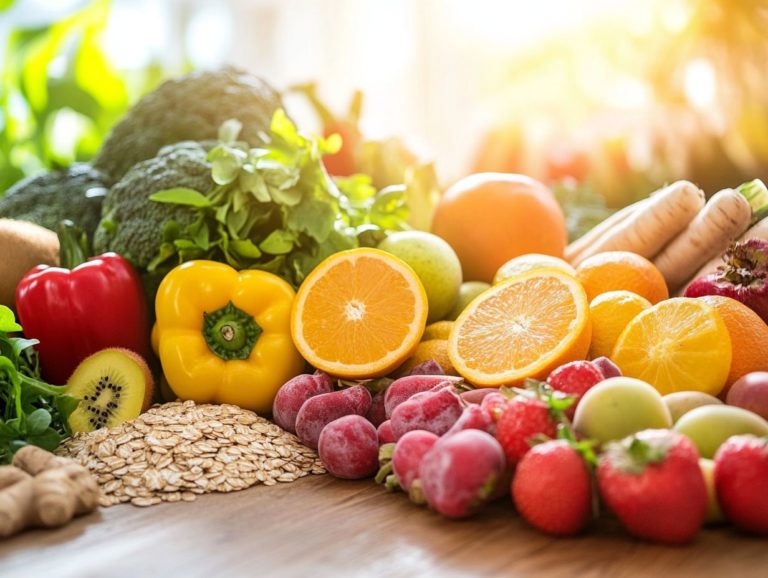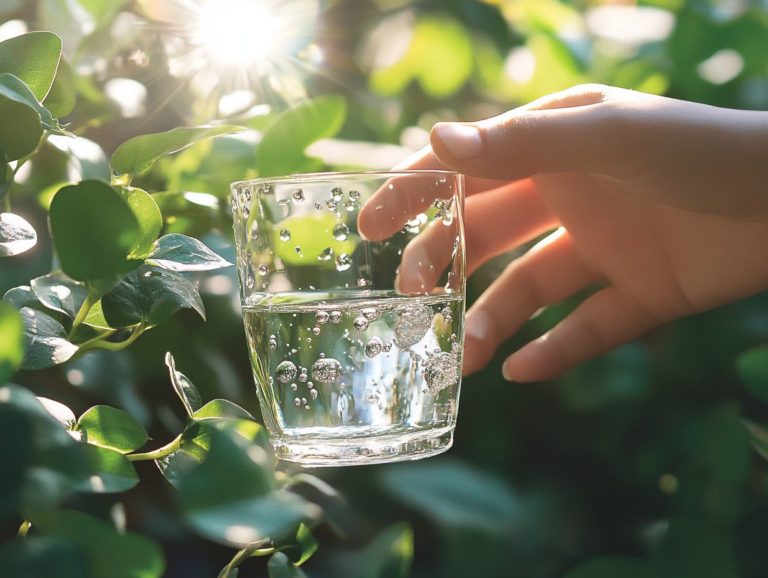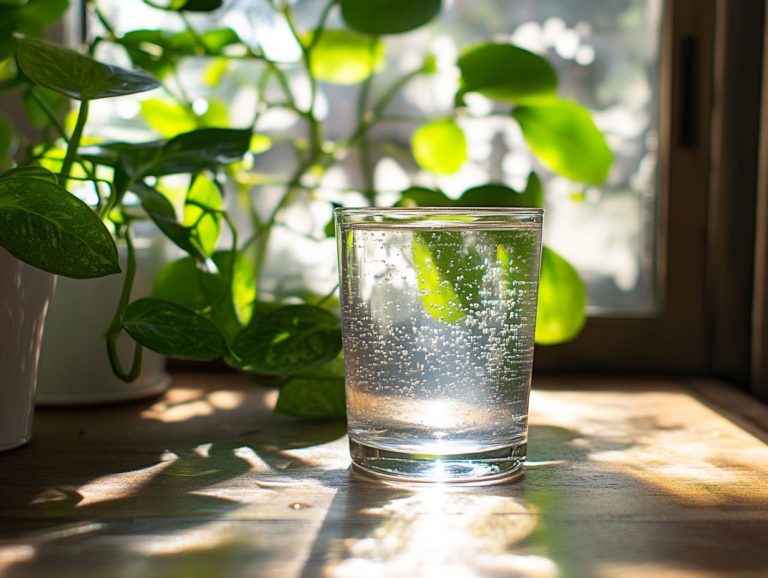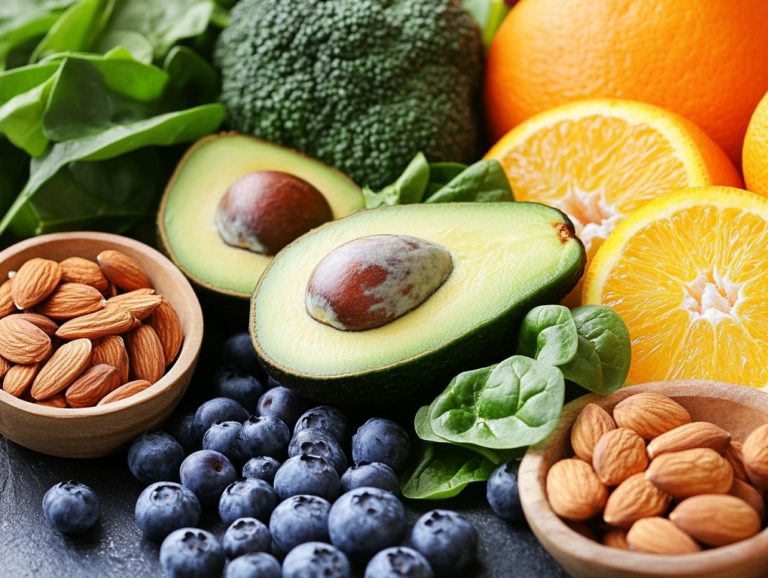What Are the Best Hydrating Foods?
Staying properly hydrated is essential for your overall health. Adding hydrating foods to your diet can truly make a significant difference.
This piece underscores the vital role food plays in hydration. It emphasizes fruits and vegetables with high water content, along with some surprising options you might not expect.
Discover practical tips for meal planning and preparation. This makes it easy to include hydrating foods in your daily routine.
There are also specific recommendations tailored for athletes and pregnant women, ensuring everyone can benefit.
Learn how making the right food choices can keep you feeling refreshed and energized!
Contents
- Key Takeaways:
- The Importance of Hydrating Foods
- Top Hydrating Foods
- Incorporating Hydrating Foods into Your Diet
- Hydrating Foods for Different Needs
- Frequently Asked Questions
- What are the best hydrating foods?
- Why is it important to include hydrating foods in my diet?
- Can I get enough hydration from just drinking water?
- Are there any hydrating foods that are not fruits or vegetables?
- How can I incorporate more hydrating foods into my diet?
- Are there any hydrating foods that are not healthy?
Key Takeaways:
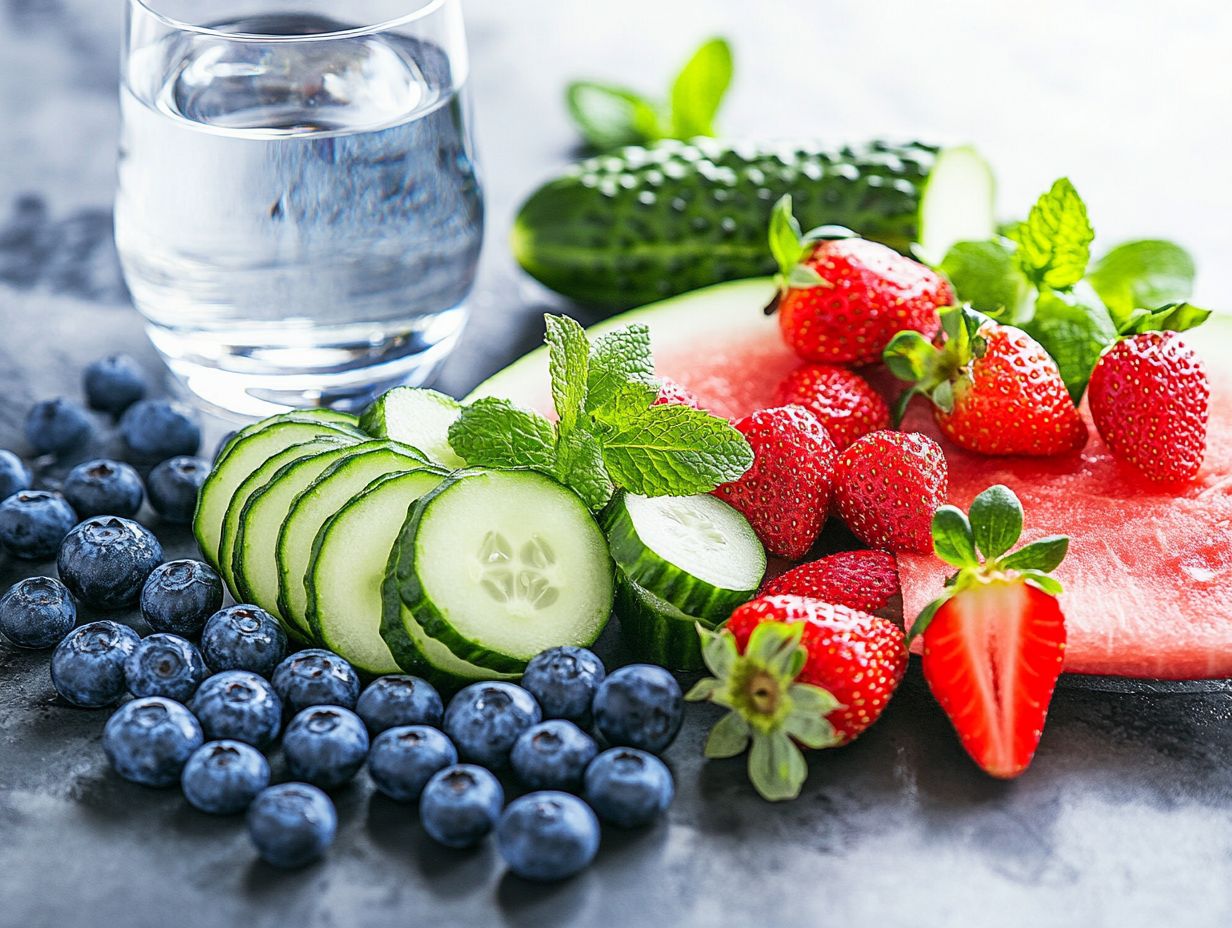
Hydrating foods play a crucial role in maintaining our body’s hydration levels and overall health.
Fruits and vegetables like watermelon and cucumber are excellent for hydration.
Other foods such as yogurt and broth can also be hydrating.
Adding hydrating foods into meals through meal planning and preparation is a simple and effective way to ensure proper hydration for different needs, including athletes and pregnant women.
The Importance of Hydrating Foods
Hydrating foods significantly contribute to your overall wellness and nutrition. They offer essential hydration that helps regulate your body temperature, lubricates and cushions vital organs, aids in waste elimination, and effectively prevents dehydration.
This helps reduce the risk of chronic conditions, including heart and lung disease. Notably, renowned nutritionist Cynthia Sass emphasizes the importance of integrating these hydrating foods into your daily fluid intake to maintain optimal health and support the aging process.
Why Food is Crucial for Hydration
Food plays a crucial role in your hydration, significantly contributing to your daily fluid intake. It offers high-quality sources of hydration that fulfill your fluid needs and encourage healthier food choices.
Consider fruits like watermelon and cucumbers, which boast over 90% water content, alongside hydrating vegetables such as celery and lettuce. These foods do more than just quench your thirst; they are also rich in essential nutrients.
Nutrients like potassium and magnesium are vital for maintaining fluid balance and muscle function. Potassium helps manage blood pressure and supports nerve function, while magnesium is important for energy production and muscle contractions.
By adding these hydrating foods to your diet, you can significantly enhance your hydration status. This is critical for various bodily functions, including digestion, circulation, and temperature regulation. Adequate hydration also helps prevent chronic conditions like kidney stones and urinary tract infections. This underscores the importance of not only drinking water but also enjoying foods that promote optimal hydration.
Top Hydrating Foods
When it comes to staying hydrated, certain hydrating foods truly shine with their impressive water content and a wealth of health benefits.
Incorporating these foods into your wellness nutrition plan is essential for optimal health.
Fruits and Vegetables with High Water Content
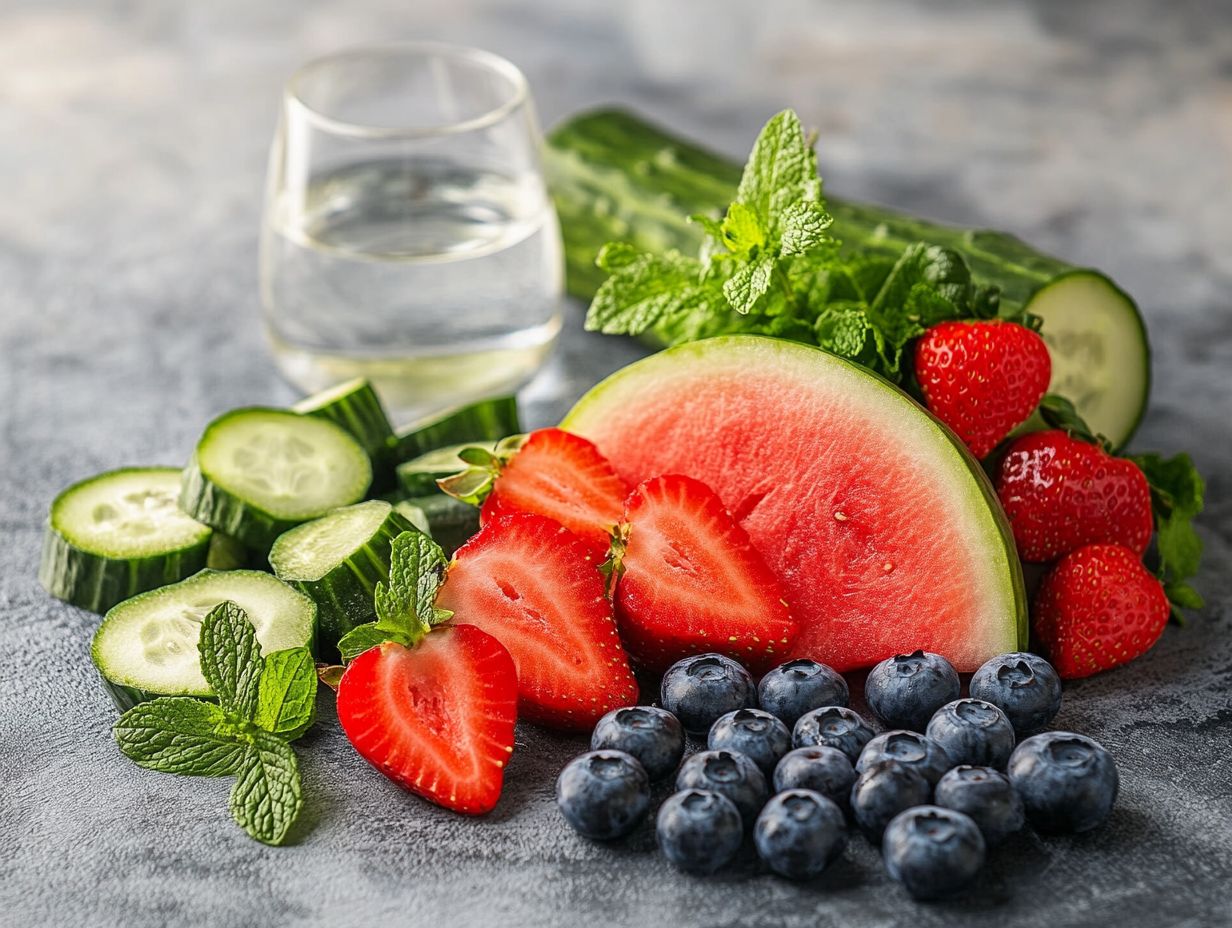
- Cucumbers
- Zucchini
- Celery
- Tomatoes
- Strawberries
- Watermelon
- Cantaloupe
Adding fruits and vegetables with high water content like cucumbers, zucchini, celery, tomatoes, strawberries, watermelon, and cantaloupe to your diet is essential for maintaining hydration and obtaining vital nutrients. These hydrating foods not only quench your thirst but also play a significant role in promoting overall health.
For example, did you know cucumbers are made up of about 95% water? They make for a refreshingly crisp addition to salads or smoothies. Zucchini is another star player; it offers fiber along with impressive hydration, making it perfect for grilling or saut ing.
Celery, with its satisfying crunch and high water content, can serve as a delightful snack when paired with hummus. Tomatoes are not to be overlooked either; they re rich in antioxidants and versatile enough for salads, sauces, or even a refreshing juice.
And let s not forget strawberries and melons they satisfy your sweet tooth while delivering essential vitamins. By weaving these hydrating foods into your daily meals, you enhance your hydration, support digestion, and contribute to a well-rounded diet.
Remember, wellness nutrition can be both enjoyable and nourishing!
Other Foods with High Water Content
Along with the usual fruits and vegetables, consider incorporating other hydrating foods like mushrooms, cabbage, jicama, kale, silken tofu, and grapefruit into your diet. These options not only provide impressive water content but also pack a nutritional punch, further supporting your hydration goals.
These hydrating foods do more than just quench your thirst; they come with a treasure trove of health benefits, making them fantastic staples in your cooking experiences.
- For instance, mushrooms add a delightful, meaty texture to stir-fries and salads.
- Jicama introduces a satisfying crunch to slaws and fresh salsas.
- Kale stands tall as a nutritional powerhouse, perfect for smoothies and soups.
- Silken tofu blends effortlessly into creamy dressings or desserts, offering protein and essential amino acids.
Don t overlook grapefruit, either. Its refreshing zest can elevate your breakfast dishes and serve as a tangy complement in savory recipes.
By incorporating these ingredients into your meals, you’ll not only meet your daily hydration needs but also deliver vital nutrients that promote your overall health and wellness.
Incorporating Hydrating Foods into Your Diet
Incorporating hydrating foods into your diet offers a delightful and advantageous experience.
With thoughtful meal planning strategies, you can effortlessly meet your daily fluid intake while savoring delicious, healthy snacks that elevate your cooking experiences.
Tips for Meal Planning and Preparation
Effective meal planning has the potential to elevate your hydration game by incorporating a variety of hydrating foods that help you meet your daily fluid needs while ensuring a balanced and nutritious diet.
By thoughtfully selecting fruits and vegetables with high water content, you can infuse your meals with essential nutrients. This helps maintain optimal hydration levels.
Choices like cucumbers, watermelons, and oranges not only quench your thirst but also deliver vital vitamins and minerals crucial for your overall wellness.
Crafting refreshing salads with these hydrating ingredients or blending them into smoothies can be delightful ways to seamlessly integrate hydration into your daily routine.
By considering hydration in your meal planning, you promote greater energy levels and improved digestion. Making a focused effort on fluid-rich foods is a critical part of healthy living.
Hydrating Foods for Different Needs
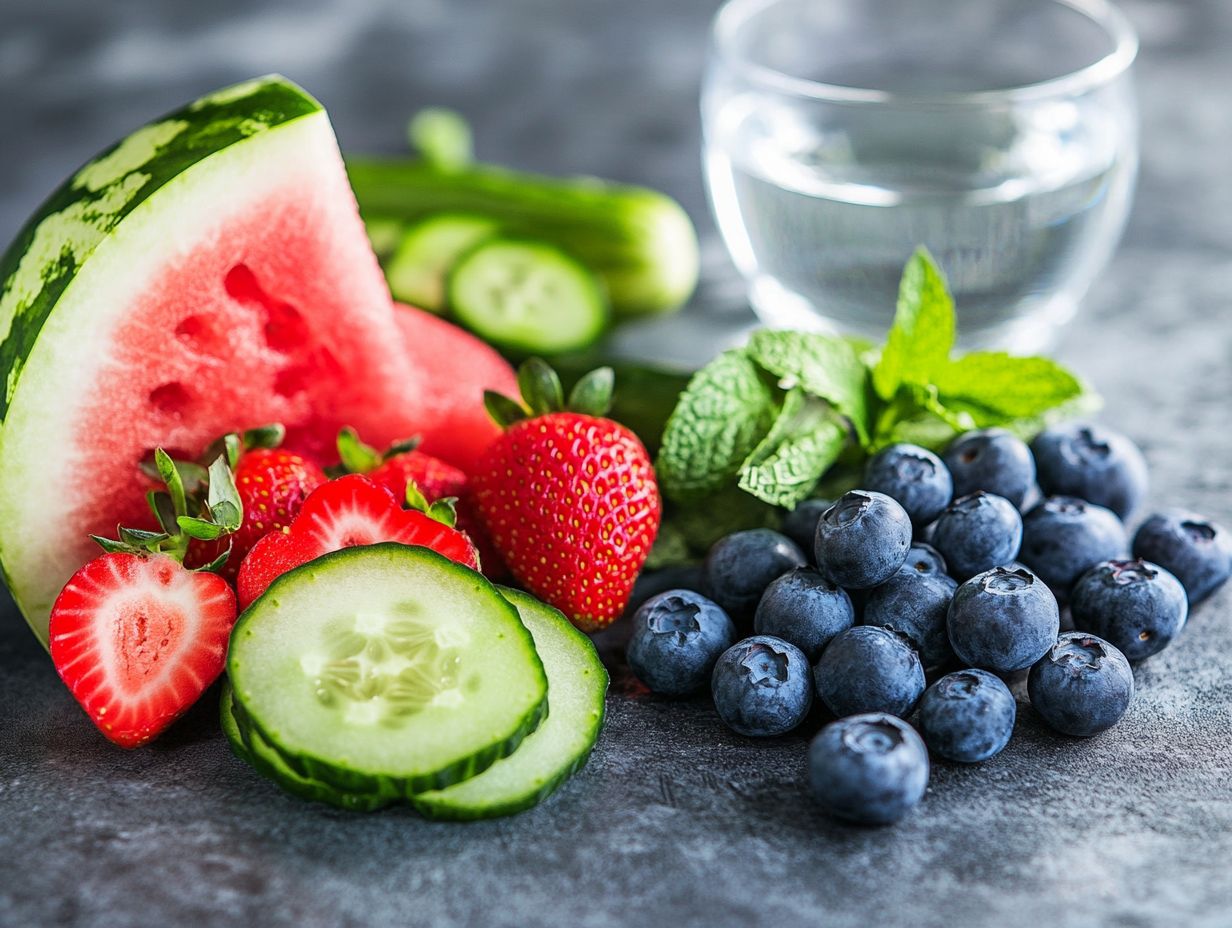
Different populations, such as athletes and pregnant women, have distinct hydration needs that call for a tailored approach.
By concentrating on specific hydrating foods, you can effectively support their wellness and nutrition goals.
Hydrating Foods for Athletes
Athletes like you need specific hydrating foods that not only quench your thirst but also serve as premium sources of vital nutrients essential for peak performance and effective recovery.
Choosing the right foods can have a significant impact on your ability to maintain optimal performance and speed up recovery after your workouts. Foods rich in electrolytes minerals that help maintain the body’s fluid balance such as potassium and sodium, are crucial for replenishing the minerals you lose during intense training sessions.
Fruits like watermelon, oranges, and strawberries are not just refreshing; they also come packed with vitamins and antioxidants that help combat oxidative stress caused by rigorous activities.
Adding vegetables such as cucumbers and celery further boosts your overall fluid intake, ensuring your hydration needs are fully met while supplying key nutrients to support muscle function and energy levels.
Hydrating Foods for Pregnant Women
Pregnant women experience increased hydration needs, making hydrating foods vital for supporting daily fluid intake and overall health during this important time.
These foods do more than just quench thirst; they deliver essential nutrients that benefit both mother and baby. Including fruits like watermelon, cucumbers, and oranges in your diet can significantly enhance hydration levels due to their impressive water content.
Leafy greens such as spinach and kale not only boost hydration but also provide essential vitamins and minerals. Hydrating foods also play a crucial role in immune support, helping to alleviate common pregnancy discomforts like swelling and fatigue.
Incorporating these delicious foods can dramatically enhance your health!
Don t wait! Start adding these hydrating foods to your meals today for better health and hydration!
Frequently Asked Questions
What are the best hydrating foods?
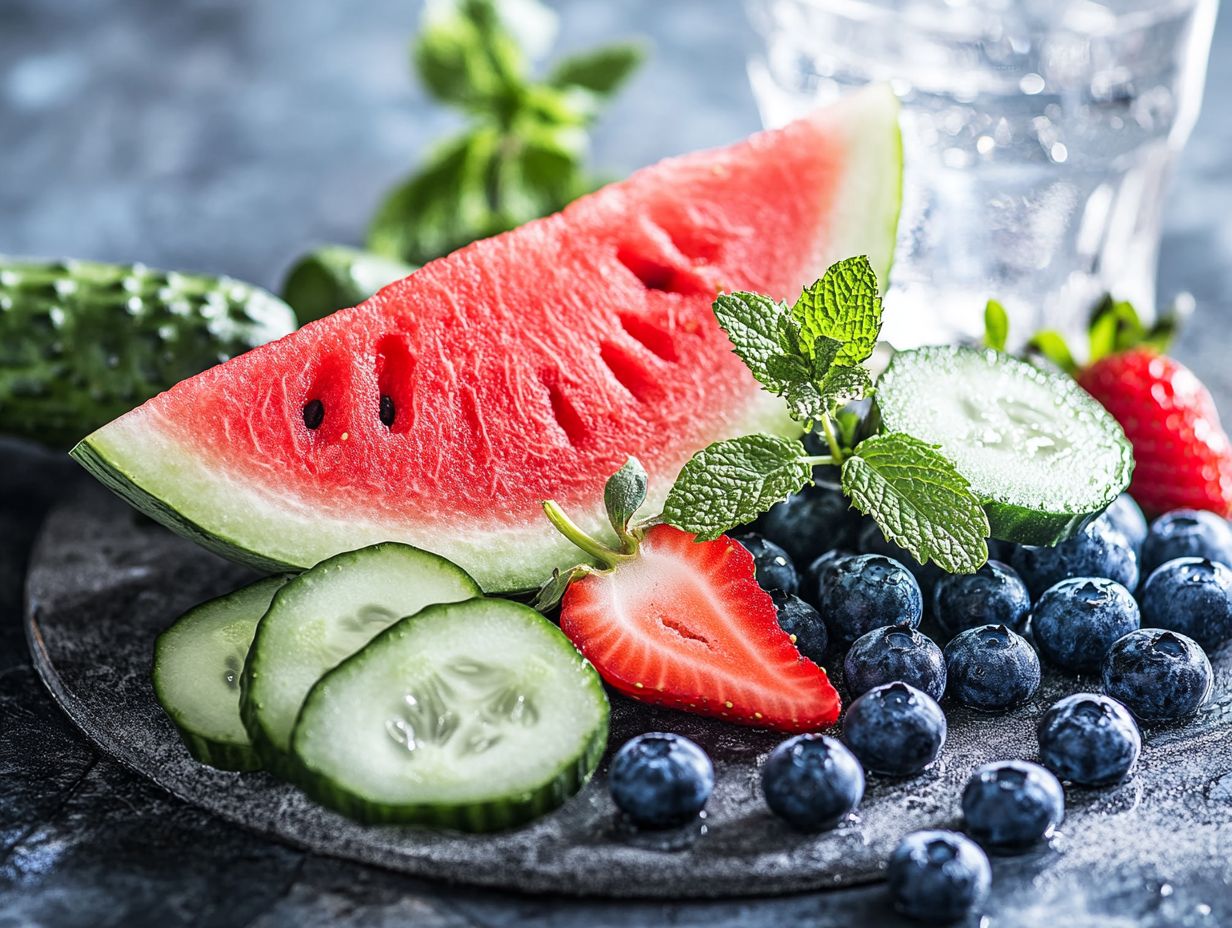
The best hydrating foods contain a lot of water. Think of cucumbers, watermelon, lettuce, celery, and strawberries!
Why is it important to include hydrating foods in my diet?
Hydrating foods help you stay hydrated. They also provide essential nutrients for your health and well-being.
Can I get enough hydration from just drinking water?
Drinking water is crucial for hydration. However, adding hydrating foods can boost your overall hydration levels.
Are there any hydrating foods that are not fruits or vegetables?
Yes! Yogurt, broth-based soups, and chia seeds are great examples.
How can I incorporate more hydrating foods into my diet?
Make hydrating foods a part of your meals and snacks. Try smoothies or add fruits and veggies to your water for a refreshing drink!
Are there any hydrating foods that are not healthy?
Absolutely. Sugary drinks and processed snacks can be hydrating but aren’t healthy. Choose nutrient-rich options instead!

